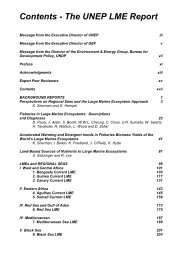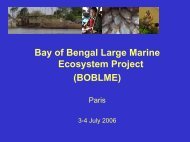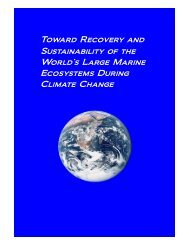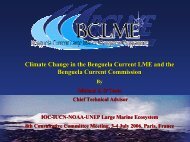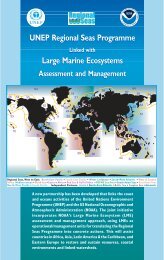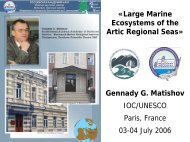Sustaining the World's Large Marine Ecosystems
Sustaining the World's Large Marine Ecosystems
Sustaining the World's Large Marine Ecosystems
Create successful ePaper yourself
Turn your PDF publications into a flip-book with our unique Google optimized e-Paper software.
November 2006. LMEs, GOOS, GEOSS and <strong>the</strong> UNEP Regional Seas<br />
Programme shared a common vision and identified <strong>the</strong> needs and areas of future<br />
collaboration, knowledge sharing, and <strong>the</strong> application of operational<br />
oceanographic skills.<br />
REPLICATION<br />
While <strong>the</strong> BCLME project was underway, we provided assistance to o<strong>the</strong>r African<br />
LME projects at various stages of development, and applied our experience and<br />
<strong>the</strong> lessons learned from cooperative marine scientific research and<br />
management. The experience gained in producing a comprehensive TDA and<br />
SAP and planning and executing <strong>the</strong> project has been invaluable and can easily<br />
be replicated in o<strong>the</strong>r GEF projects. Our practical experience in strategic<br />
planning and institutional building, and <strong>the</strong> models used can be of great value<br />
especially with regard to <strong>the</strong>ir application to eastern boundary upwelling systems.<br />
The BCLME project also assisted <strong>the</strong> Secretariat of <strong>the</strong> Abidjan Conventions<br />
(UNEP) in developing policy on how best to apply <strong>the</strong> mandate of <strong>the</strong> Convention<br />
to protect <strong>the</strong> coastal and marine environment. The Benguela Current<br />
Commission provided a useful model as a regional mechanism for implementing<br />
<strong>the</strong> Convention.<br />
International linkages were successfully established with <strong>the</strong> GEF—supported<br />
Humboldt Current LME project and with <strong>the</strong> Pacific Islands through collaborative<br />
workshops and exchange visits, some of which were sponsored by GEF<br />
IW:LEARN. These contacts led to <strong>the</strong> cooperation of scientists in <strong>the</strong> Benguela<br />
and in <strong>the</strong> Humboldt Current upwelling regions, with a sharing of knowledge on<br />
<strong>the</strong> ecosystems approach to fisheries management and <strong>the</strong> monitoring of top<br />
predators as a measure of ecosystem health.<br />
Good outreach, high visibility and focused public relations were central to <strong>the</strong><br />
success of <strong>the</strong> BCLME project and in obtaining <strong>the</strong> necessary political will for<br />
establishing <strong>the</strong> Benguela Current Commission. The appointment of a media<br />
liaison officer who coordinated <strong>the</strong> production of annual newsletters, supervised<br />
<strong>the</strong> operation of a comprehensive website, and wrote featured articles in regional<br />
and international marine publications, ensured that a high profile for <strong>the</strong> project<br />
was maintained. A BCLME brand and logo were also established, which are now<br />
internationally known. Two published books, “The Benguela – Predicting a <strong>Large</strong><br />
<strong>Marine</strong> Ecosystem” (Elsevier Press), and “Benguela – Current of Plenty” – a<br />
History of International Cooperation in <strong>Marine</strong> Science and Ecosystem<br />
Management” (Benguela Current Commission), provided a record of ongoing<br />
scientific achievements, capacity building and institutional development and<br />
change.<br />
60



